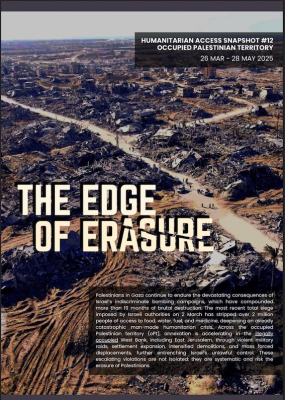Holy Land: Churches and aid agencies latest humanitarian report

Source: CMEP
Washington DC based Churches for Middle East Peace (CMEP), alongside dozens of international aid and development agencies, have released their latest Humanitarian Access Snapshot on Gaza and the West Bank: Edge of Erasure, covering the period from March 26 to May 28, 2025.
The people of Gaza continue to endure the devastating consequences of Israel's indiscriminate bombing campaigns, which have compounded more than 19 months of brutal destruction. The most recent total siege imposed by Israeli authorities on 2 March stripped over two million people of access to food, water, fuel, and medicine, deepening an already catastrophic man-made humanitarian crisis. Across the rest of the occupied Palestinian territory (oPt), annexation is accelerating in the illegally occupied West Bank, including East Jerusalem, through violent military raids, settlement expansion, intensified demolitions, and mass forced displacements, further entrenching Israel's unlawful control. These escalating violations are not isolated; they are systematic and risk the erasure of Palestinians.
Nearly three months have passed since Israeli authorities imposed another total siege on Gaza on 2 March. On 19 May, the Israeli cabinet approved a decision to allow "basic" food into Gaza. This is merely a drop in an ocean of needs. Conditions imposed by Israeli authorities continue to prevent large-scale humanitarian aid delivery. Of the small amounts of aid that have been allowed to enter Gaza, very little has actually reached families. In the face of such systematic devastation - widespread injuries and illness combined with acute malnutrition, and dehydration, poor sanitation, and the growing threat of waterborne disease, and virtually no sanitation - deaths from these intersecting conditions will soon accelerate, and will not be prevented by token and piecemeal deliveries of food parcels under any militarized supply distribution scheme. Only a comprehensive, multi-sectoral response at scale can even start to address the overwhelming, man-made humanitarian crisis.
46 international and Palestinian NGOs participated in a survey sharing their experiences delivering humanitarian aid and services from 26 March to 9 May. From those, 40 operate in Gaza, 29 in the West Bank and 23 have operations across the entire oPt. While the results do not capture every NGO operating in the oPt, they reflect the deteriorating operating environment and the range of obstacles to delivering aid.
Key Findings:
Of the 40 surveyed organizations working in Gaza…
-93% reported they have exhausted or nearly exhausted their aid stocks inside, while miles of aid are blocked from entering Gaza from outside.
-Two-thirds reported being unable to reach and deliver services to communities in need
-One-third reported staff injuries or deaths due to attacks by Israeli forces in Gaza
Of the 29 surveyed organizations working in the West Bank…
-93% say they faced increased movement restrictions in the West Bank, with settler attacks and military raids escalating across northern governorates, impacting their ability to reach communities in need.
-38% reported having had suspended or reduced their operations in the West Bank
-48% reported being unable to reach communities in parts of the West Bank.
"The international community must no longer turn a blind eye to the mounting atrocities and deliberate obstruction of life-saving aid in Gaza and the West Bank," said Rev. Dr. Mae Elise Cannon, Executive Director of Churches for Middle East Peace.
"The conditions outlined in this report are not the result of a natural disaster or scarcity-they are the consequence of intentional policy choices being made by the Israeli government and being allowed by the world. Failing to act now is complicity in the collective punishment of millions."
As a coalition of 36 national church denominations and organizations, CMEP remains steadfast in its advocacy for a just peace in the Holy Land and an end to the violence and occupation that fuel such humanitarian catastrophes.


















